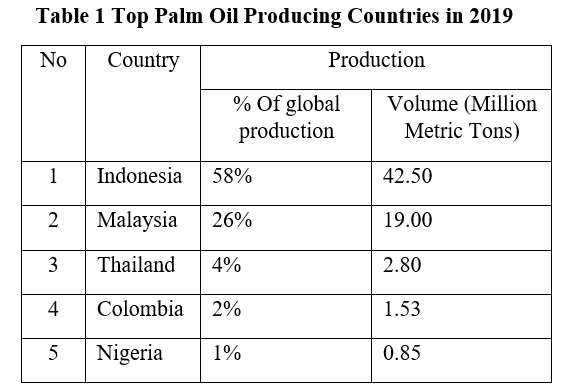The flow of palm oil globally has contributed to economic development and food security.

Source: Which Countries Produce Palm Oil. Statista
Table 1 shows Southeast Asian countries are important contributors to palm oil production (Indonesia, Malaysia and Thailand are top producers). According to China Dialogue, Southeast Asia is the center of global palm oil production, with Indonesia and Malaysia producing around 85% of the world’s supply.
The recent high demand for palm oil increases the likelihood of deforestation and climate change from production. According to the Yale Center for Business and The Environment, more than 3.7 million hectares of natural forest have been cleared in Indonesia and Malaysia in recent years to make way for palm oil plantations. Therefore, this land use contributes to global climate change, with deforestation creating 20% of global greenhouse gas emissions. In addition, according to the World Resources Institute analysis of agricultural commodities contributions to deforestation from 2001-2015, the palm oil sector ranked 2nd after the livestock industry and caused 10.5 million hectares of deforestation. Therefore, palm oil negatively impacts the climate through deforestation.
Simultaneously, the existence of the palm oil industry is needed, not merely to meet food security but also in small part to replace renewable energy. Palm oil consumption can be placed into 3 categories: 1) food 2) industrial applications 3) bioenergy. Over two-thirds (68%) of palm oil is used in foods ranging from margarine to chocolate, and cooking oils, 27% is used in industrial applications and consumer products such as soaps, detergents, and cosmetics , and 5% is used as biofuels for transportation, electricity or heat.
The usage of palm oils as biofuels could be an opportunity for countries looking to increase renewable energy such as the United States. Under US law, the US Environmental Protection Agency (EPA) is responsible for administering the Renewable Fuels Standards (RFS) program. This program seeks to cut greenhouse gas (GHG) emissions and reduce the United States’ dependence on fossil fuels by increasing the use of biofuels. The law establishes different categories of renewable fuels and the level of GHG reductions they must meet to qualify as renewable.
The result of The EPA's Assessment shows biofuels sourced from palm oil in Indonesia and Malaysia did not meet the minimum 20 % lifecycle greenhouse gas reduction threshold needed to qualify as renewable fuel under the scheme. This policy does not allow the product to be currently placed in the EPA category of renewable fuel.
Based on this, Southeast Asian countries, especially Malaysia and Indonesia, must consider sustainability mechanisms in the palm oil sector to attempt renewable biofuels for future markets in the United States. The approach could be used as a green supply chain. A green supply chain can be defined as logistic structures focused on production and distribution of products in an environmental friendly manner. Underlining the concept of green supply chain is innovation in the implementation of a supply chain based on environmental factors that includes activities such as reduction, recycle, reuse and substitution of materials.
The question is how a green supply chain can be applied in the palm oil sector. It must be divided in 2 phases. First, the firms must meet the requirements in international standards for instance RSPO (Roundtable of Sustainable Palm Oil) and ISPO (Indonesia Sustainable Palm Oil), also NDPE (No Deforestation, No Peat, No Exploitation) instruments. In addition, the green supply chain process in palm oil sector must consider environmental factors in all elements of production including infrastructure, technology and materials.
Therefore, science diplomacy between the United States, Indonesian, and Malaysian governments should work to structure renewable and sustainable palm oil production in the future. This step must include regional cooperation and involve multikey stakeholders such as governments, palm oil producers, economists, and scientists in the decision-making process.
Nor Anisa holds a Bachelor of Social Science in international relations from Mulawarman University, where she graduated in 2021. She is from Indonesia and a YSEALI Academic Fellow (Environment Issues and Natural Resources Management) with the East-West Center.
The Young Southeast Asian Leaders Initiative (YSEALI) is a signature program of the U.S. Department of State’s Bureau of Educational and Cultural Affairs (ECA) in order to strengthen leadership development across the Association of Southeast Asian Nations (ASEAN), deepen engagement with young leaders on key regional and global challenges, and strengthen people-to-people ties between the United States and Southeast Asia.